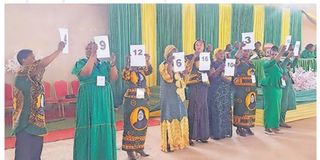CCM selects special Seats candidates amidst drama, tension

Former councillor candidates for special seats in Musoma Municipality displaying their numbers during the referendum recently. PHOTO | BELDINA NYAKEKE
What you need to know:
- With the 2025 General Election fast approaching, the ruling CCM has entered the decisive stage in selecting its Special Seats councillors through the party’s women’s wing. Across the country, the internal process has been characterised by intensive training, anti-corruption messages and high political drama
Dar es Salaam. With Tanzania’s 2025 general election fast approaching, the ruling party Chama Cha Mapinduzi (CCM) has entered a decisive stage in selecting its special seats councillors through the Tanzania Women’s Union (UWT).
Across the country, the internal process has been characterised by intensive training, firm anti-corruption messages and moments of high-stakes political drama.
In Mbeya Urban, 36 aspirants vied for special seats in the CCM primaries, but only 12 advanced. Notably, incumbent councillors Zabibu Kimata and Agatha Ngole were voted out, signalling a potential shift in grassroots expectations. Florence Mwakanyamale led with 907 votes, narrowly ahead of Catherine Ipopo, who secured 875, representing Sisimba and Iyunga wards, respectively.
Commenting on the results, CCM’s Mbeya Urban Secretary, Mohamed Mavalla, emphasised: “The primaries are not the final decision. Names will undergo further scrutiny by the party’s higher organs. I urge all candidates to remain calm and patient.”
In Moshi Urban, an unusual but transparent approach was adopted, candidates were allowed to tally votes themselves. The contest drew 28 candidates and 688 delegates, and campaigns featured a local flair. Phrases like ‘Shikamoo kura’ captured attention on the campaign trail.
UWT secretary for Moshi Urban, Catherine Sarwatt, praised the calibre of contenders: “We’ve identified candidates who are deeply attuned to women’s needs. The vetting process was rigorous to ensure impactful representation.”
Still, the process was not without hiccups. A mix-up in ballot numbering caused confusion, with one candidate lamenting: “I was assigned number 17 but appeared as 15 on the ballot. That misstep cost some of us dearly.” In Musoma Municipality, candidates centred their campaigns on local economic empowerment—specifically the effectiveness of 10 percent interest-free council loans to women.
Mr Mariam Kigoya decried delays and alleged favouritism: “The loans feel more like punishment than support. Disbursement is slow, and some officials expect 'incentives' before processing applications.”
Her sentiments were echoed by Ms Anifa Majura: “Many women are unaware that these funds even exist. The system needs greater transparency.” Musoma UWT chairperson Stella Mtani made an impassioned appeal, “Choose leaders who will act, not just speak. Empowerment must begin at the grassroots.”
In Bukoba Rural and Geita, the political mood was electric, with over 4,000 delegates participating. Authorities stepped up vigilance, deploying plain-clothes officers from the Prevention and Combating of Corruption Bureau (PCCB) to prevent vote-buying. Geita’s election supervisor Hashim Komba reiterated the spirit of the exercise, “This is not a popularity contest. We are choosing genuine representatives who will stand up for women.”
CCM Geita Secretary, Michael Msuya, added: “Preparations were 100 percent complete. We are proud of the democratic engagement witnessed.” In Manyara Region, the process unfolded peacefully, albeit under stern guidance from regional leaders. Babati District Commissioner, Emmanuela Kaganda, issued a blunt warning: “Bribery erodes public trust. Leaders who purchase power have no sincere intent.”
For her part, the Parents’ Wing Secretary, Christina Masagasi, cautioned voters: “Let women not be swayed by money or intimidation. Choose wisely, for integrity, not greed.”
Special Seats MP Regina Ndege shared on a spiritual note: “Let’s pray for this process and for all our candidates. This marks a significant chapter in women’s leadership in Manyara.” In Dodoma Urban, CCM took extraordinary measures to uphold integrity. Candidates were confined to the voting venue, their phones confiscated, and their movement restricted to prevent external influence.
One participant described the experience said, “We felt like we were in quarantine, but maybe that’s what it takes to eliminate vote-buying.”
At Mwigobero Ward, tension erupted when non-delegates attempted to breach the hall, prompting swift intervention by security. In Kikombo Division, a flawed ballot arrangement forced the vote to be repeated.
Beyond party politics, national institutions are also preparing for the broader electoral calendar. During a training session held on 21 July for election coordinators from Arusha and Manyara, Commissioner of the Independent National Electoral Commission (INEC), Dr Zakia Mohamed Abubakar, urged officials to uphold impartiality and the law.
“We selected you because of your competence and integrity. Do not allow yourselves to be misused or become sources of conflict,” she said.





